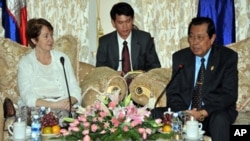The vice president of Cambodia’s National Assembly, Nguon Nhel, says the leadership of the country is still trusted by the international community, despite some criticism and recent comparisons to Middle Eastern dictatorships.
Prime Minister Hun Sen in recent weeks has railed against critics who compared him to the fallen leader of Libya, Muammar Gaddafi, and in an interview this week, Nguon Nhel, a senior member of the ruling Cambodian People’s Party, said international donors have continued their support.
Opposition leader Sam Rainsy resigned from the National Assembly, along with his deputy, last month, in a move he said would delegitimize the lawmaking body by bringing its number too low to hold session. He has called on foreign donors to stop giving aid and loans to Cambodia.
Legal analysts, however, have said the constitution does not require 120 lawmakers be present but that seats emptied through resignations must be refilled by their respective parties.
Nguon Nhel said Cambodia is only borrowing about 30 percent of its gross domestic product and that such moves will not hurt its borrowing.
“This is a reality in the world,” he said. “If they anticipate that in the future we cannot pay it back, they won’t lend to us.”
Cambodia has continued to make progress despite the world economic downturn, he said. He said that claims made by Sam Rainsy on “Hello VOA” recently, that Cambodia is misusing loans and aid, were “exaggerated.”
He also said the National Assembly only requires a quorum of just over 60 members, which is possible despite a Sam Rainsy walkout. This means the assembly will not negotiate with Sam Rainsy over the resignations, he said.
Regarding land disputes, Nguon Nhel said they were the result of a country in development and that Cambodian leaders were weighing the gains and benefits of land concessions and other developments. “Without some compromise, it is impossible,” he said.
Regarding elections, he said about 3,000 monitors and observers take part during the vote. “They see the result of the election is acceptable,” he said. “This is a democracy.”
That has meant development, he said, not suppression, including more bridges and roads and a decrease in the number of poor, from about half the population in 1993 to 20 percent today.
Under these conditions, Cambodia should not be compared to Middle Eastern dictatorships, he said.
“Now we’re compared to Arabs!” he said. “A democratic country does not depend on individualism at all. It depends on people who give power in an election, democratically. If the people give power obviously, how can it still be that people do demonstrations to topple the power that the people have offered?”
“Like in Libya, it is different,” he said. “Gaddafi came to power through a coup and did not have an election for 42 years of power. He held power because of the coup, which toppled a monarchy.”
Cambodia has a monarch and a government framework put in place by signatories of the Paris Peace Accords, he said. “We’ve complied accordingly and done nothing wrong.”
Phay Siphan, a government spokesman, said Cambodia and Middle Eastern countries are “as different as earth and sky.”
“We can’t be compared with them,” he said. Cambodia is developing a “free and democratic society, which means that the supreme power is the people, and people have the right to select the leaders and parties that they like,” he said. “This we have done gradually.”




